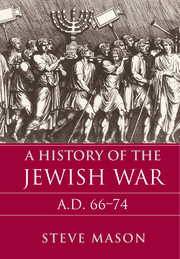Book contents
- Frontmatter
- Contents
- List of Illustrations
- List of Tables
- Acknowledgements
- Part I CONTEXTS
- 1 A FAMOUS AND UNKNOWN WAR
- 2 UNDERSTANDING HISTORICAL EVIDENCE: JOSEPHUS’ JUDEAN WAR IN CONTEXT
- 3 PARTHIAN SAVIOURS, SIEGES, AND MORALE: ANCIENT WARFARE IN HUMAN PERSPECTIVE
- Part II INVESTIGATIONS
- CONCLUSIONS
- Appendix
- Bibliography
- Bibliographical Abbreviations
- Index of Modern Authors
- Index to Historical Persons, Groups, and Places
- Index of Texts, Inscriptions, and Papyri
2 - UNDERSTANDING HISTORICAL EVIDENCE: JOSEPHUS’ JUDEAN WAR IN CONTEXT
from Part I - CONTEXTS
Published online by Cambridge University Press: 05 February 2016
- Frontmatter
- Contents
- List of Illustrations
- List of Tables
- Acknowledgements
- Part I CONTEXTS
- 1 A FAMOUS AND UNKNOWN WAR
- 2 UNDERSTANDING HISTORICAL EVIDENCE: JOSEPHUS’ JUDEAN WAR IN CONTEXT
- 3 PARTHIAN SAVIOURS, SIEGES, AND MORALE: ANCIENT WARFARE IN HUMAN PERSPECTIVE
- Part II INVESTIGATIONS
- CONCLUSIONS
- Appendix
- Bibliography
- Bibliographical Abbreviations
- Index of Modern Authors
- Index to Historical Persons, Groups, and Places
- Index of Texts, Inscriptions, and Papyri
Summary
And yet it should be obvious that, for the very historical purposes for which the book is now chiefly studied, it is misleading and dangerous to use what is plainly one of the most sophisticated products of ancient historiography without constant regard to the plans and purposes of its author.
D. A. Russell wrote this in 1966 concerning Plutarch's Lives. Others have issued similar warnings about trying to extract raw facts from texts while ignoring their nature, structures, and themes. In principle all survivals from the past, material or literary, need first to be understood for what they are if we are to use them to answer other questions. Recognition of this in the case of Josephus’ War and Antiquities–Life has been recent and partial. This chapter is mainly an effort to understand Josephus’ War, because it is the most important literary source for the following chapters. We need to begin, however, by clarifying where the interpretation of evidence fits in the larger project of historical investigation. And this requires us to think about the surprisingly difficult question: What is history?
History and interpretation
Historians are often impatient with theory. We feel that we know what we are doing, and abstract philosophizing can get in the way. We should just get on with the hard work. Going theory-less, however, can create miscommunication. In the final months of preparing this book I have heard professional historians express such views as these: History is the past or an authoritative account of it; historians must follow the evidence and avoid speculation; history concerns itself with elite literary texts and neither material evidence or the life of ordinary folk, which are the province of archaeologists; historians are either maximalists or minimalists, realists or postmodernists, left-wingers or conservatives, or they fall in some other two-kinds-of-people scheme. A problem relevant to this chapter is the notion that those who care about the meaning of texts must be literary types unconcerned with the actual past. And these positions are held by historians. If we include more popular ideas about history, including those espoused by political leaders and school boards, the picture becomes bewildering.
This is not the place, my publisher insists, for a head-on discussion of the nature of history. Dedicated discussions of the problem are easy to find, even if I cannot recommend one that perfectly matches my outlook.
- Type
- Chapter
- Information
- A History of the Jewish WarAD 66–74, pp. 60 - 137Publisher: Cambridge University PressPrint publication year: 2016



